Exposed: How the corporate media in West is suborned by Zionist influence
By David Miller
On May 30, Leader of the Islamic Revolution Ayatollah Seyyed Ali Khamenei published a letter addressed to students on US campuses protesting against the Israeli genocidal war on Gaza.
The title of the letter was “As the page of history is turning, you are standing on the right side of it.”
Among his words of advice was a statement about the role of the media: The global Zionist elite – who owns most US and European media corporations or influences them through funding and bribery – has labeled this courageous, humane resistance movement as "terrorism."
To Western ears, this may sound like an exaggerated or simplistic account of how the media works. But let us examine the various elements of the media system and how it is influenced.
The first thing to note is that perhaps the most important element setting the tone of coverage in the Western media is the role of official sources in defining what is legitimate and illegitimate violence.
Thus, in the case of Palestine, Zionist regime sources have a built-in advantage over those of the resistance or even of Palestinians in general.
Studying media bias
Every decent study of Western media concludes the same. For example the work of Greg Philo and Mike Berry in their series of books including Bad News From Israel and More Bad News from Israel, and most recently a study of the coverage of Gaza.
Greg’s recent death robs us of one of the most consistent critics of the idea that the media are biased against the Israeli regime.
These institutional practices are why we see the overwhelming blanket coverage of Zionist inventions like the 40 beheaded babies claim or the mass rape thesis or even the claim that “Hamas killed 1200”.
These have been debunked time and again since the events of October 7 but they still retain a meaningful grip on the Western imagination.
Even more fundamental than that is the definition of terrorism which is embedded in the counter-terrorism apparatus of most countries in the West.
Counter-terrorism with Zionist characteristics
Between 2003 and 2015, the following policies adopted neoconservative counter-terror policies in this order: the United Kingdom, European Union, Netherlands, France and Spain.
These policies moved away from a law enforcement approach and adopted a policy based on “radicalization” in which nonviolent ideas, values and practices come to be seen as suspect and are subject to state sanction.
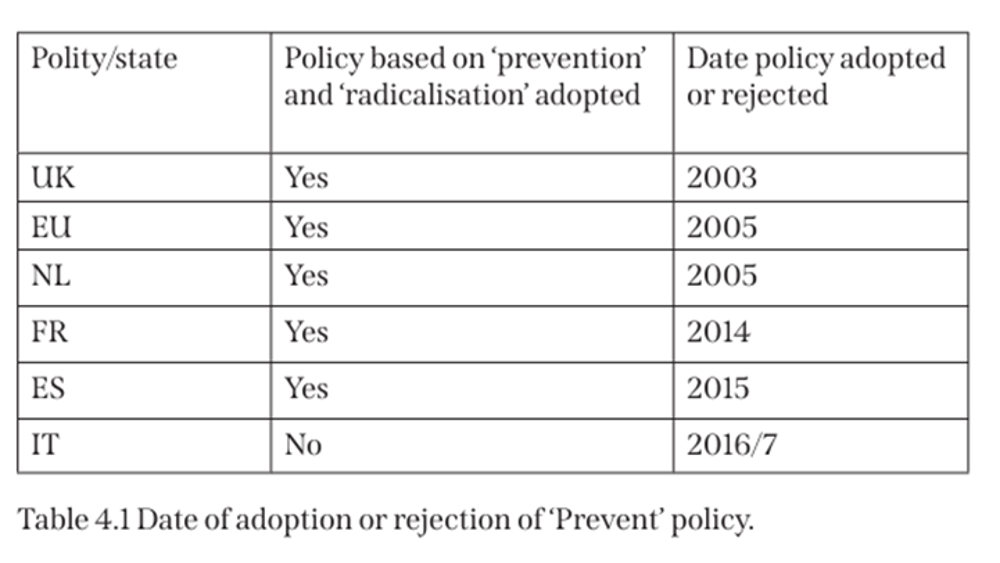
A fundamental and primary threat is seen to come from Islam. This is a discourse that in the West is substantially informed by the Zionist regime. As Remi Brulin has explained:
In the American and Israeli cases, this process of meaning construction is most clearly seen at work during the last decade of the Cold War. In July 1979, the Jonathan Institute, a group with intimate ties to the Israeli government, organized a major conference on “international terrorism” in Jerusalem.
This event announced the beginning of a deliberate, and ultimately extraordinarily successful, Israeli public relations offensive aimed at convincing the United States of the seriousness of the “terrorist” threat, a threat squarely identified with the Palestinians and their allies around the world…
By the end of Ronald Reagan’s first term, American elected officials had come to accept and adopt the main claims and assumptions that had, for years, been at the heart of the Israeli discourse on “terrorism.”
“Islamic terrorism” and “Islamism”
Concepts such as ‘Islamism’ and ‘Islamic terrorism’ derive in origin substantially from the efforts of Zionist figures with a specific impetus from Israeli premier Benjamin Netanyahu himself, via the second Jonathan Institute conference organized in 1984 in Washington DC.
It can be noted that the term ‘Islamist’ was effectively invented in the late 1970s and then popularised especially by Zionist intellectuals like Bernard Lewis, most notably via the 1984 conference.
As a result, official sources inside a particular country are dominant (more dominant than those of a foreign power like the Zionist entity) in news about political violence, or Islam, and the security and intelligence sources of France, Spain or the UK predominate.
But Zionist assumptions have already been baked into these policies.
We can see the macro pattern of the relation between official sources and the publication of books in English via the Google Ngram tool.
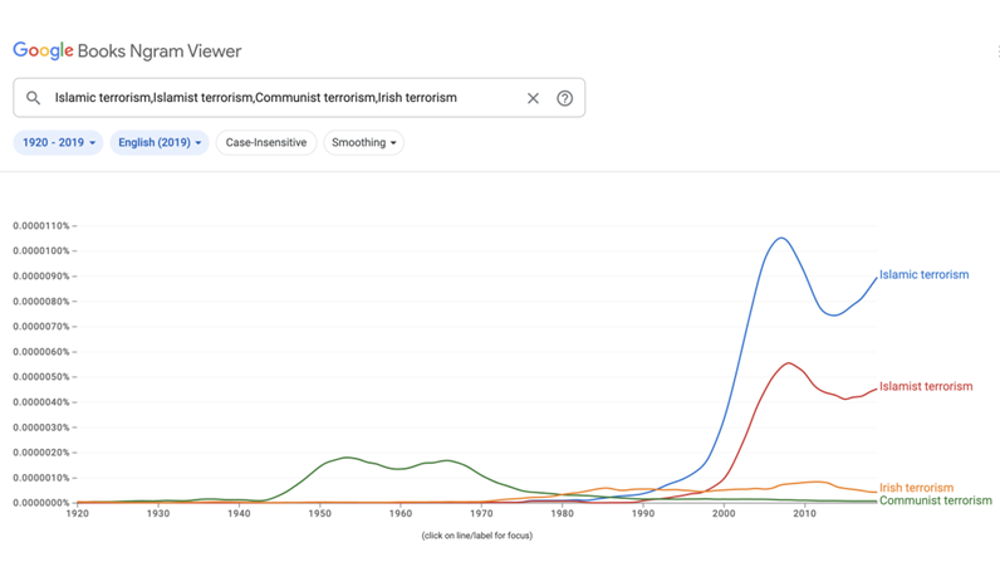
This shows the total dominance in English of discussion of negatively evaluated political violence and its association with Islam from the mid-1990s onwards.
The mainstream media are thus locked into a structural misinformation about how to conceive of political violence which itself is heavily influenced by the Zionist entity and by a structural preference for the views of genocidal Zionists over those of their victims.
Ownership, control and Zionist penetration
The negative pattern of reporting throughout the whole of the mainstream media is exacerbated by Zionist penetration of the ownership and control of media corporations and by the infiltration of Zionists into news organizations as editors, columnists and journalists.
There is a pattern of prominent Zionists or strong Zionist sympathizers - as owners or managers - directly appointing or indirectly influencing appointments of managerial, editorial and reporting staff. This of course also helps to inculcate ideas about targets and lines to take. Some examples:
- Axel Springer is a massive German media company that is one of the largest mass media publishers in Europe, with numerous multimedia news brands, such as Bild, Die Welt, Fakt, and the US political news site Politico, which it acquired in 2021.
It is openly ideological about its support for the Zionist entity, even telling workers in June 2021 to leave its employ if they objected to Israeli flags flying outside the office. On its website, the Times of Israel reports, the publisher “lists five ‘Principles and Values.’ The second states: ‘We support the Jewish people and the right of existence of the State of Israel.’”
- In France, billionaire Patrick Drahi is a significant media owner. In occupied Palestine, he runs the news channel i24 which is stuffed full of former occupation forces members. He recently bought the famously left-wing French paper Liberation.
In 2020, he appointed Dov Alfon, formerly of Israeli Intelligence Unit 8200, as editor-in-chief. Drahi’s media holding company is called Altice and it has been listed on the UN database of companies involved in "the provision of services and utilities supporting the maintenance and existence of settlements" in occupied Palestine.
- For some Zionist-friendly media moguls, like Rupert Murdoch, their Zionist sympathies are both ideological and business-based. He famously apologized for criticizing the “Jewish-owned press” for being insufficiently Zionist.
His 'philosemitism' is, however, well known. This year, at 93, Murdoch married, for the fifth time, to the former mother-in-law of Jewish Russian oligarch Roman Abramovich. In 2006 Murdoch appointed the fanatical Zionist and former Spanish Prime Minister Jose Maria Aznar to the board of News Corp.
Murdoch's strong personal and business attachments to Israel led him to become “a strong political backer and close friend of (former Israeli) Prime Minister Ariel Sharon.” Murdoch's “close relationship with Sharon and heavy investment in Israel led former Times Africa correspondent Sam Kiley to resign his position”.
As Kiley put it: "The Times foreign editor and other middle managers flew into hysterical terror every time a pro-Israel lobbying group wrote in with a quibble or complaint… and then usually took [the lobby's] side against their own correspondent...No pro-Israel lobbyist ever dreamed of having such power over a great national newspaper."
After one conversation in which Kiley was asked not to mention a 12-year-old Palestinian boy who was killed by Israeli troops, the reporter "was left wordless, so I quit." Murdoch has also been honored by a series of Zionist groups such as the American Jewish Congress (1982), United Jewish Appeal (1997), the American Jewish Committee (2009), and the Anti-Defamation League (2020).
Murdoch’s empire has also had a close relationship with Netanyahu including secret meetings in 2016 and appears on the leaked list of Netanyahu’s millionaires from 2007 as a potential source of funds.
In January 2024 Lachlan Murdoch the heir to the empire was reported to be visiting occupied Palestine for “a meeting with Netanyahu that was intended to remain a secret”, He was also reported to be meeting “with National Unity Party leader Benny Gantz.”
Zionist columnists
There is a pattern of Zionist-friendly owners ensuring that Zionist infiltrators are appointed to key positions as reporters or columnists and encouraging non-Zionist journalists to pursue Islamophobic and pro-Zionist lines of investigation.
Take the example of the Murdoch empire in the UK where on the Times alone, the following were appointed as columnists
- Michael Gove, UK Conservative minister; neocon ideologue, co-founder of the Islamophobic think tank Policy Exchange; Times columnist.
- Danny Finkelstein, Conservative peer; chairman of the Policy Exchange from 2011 until September 2014. Associated for some time with the Islamophobic Gatestone Institute.
- David Aasronovitch – former communist student activist, now strongly pro-war and Zionist – a “radical moderate” as he puts it.
- Oliver Kamm, leader writer and columnist from 2008 to 2023. A self-professed Islamophobe and admirer of the genocidal Zionist entity, Kamm has made a habit of attacking critics of Zionism and Western power and has been affiliated with the Islamophobic Henry Jackson Society, being a signatory of its statement of principles in 2005.
- Hugo Rifkind, son of the former Foreign Secretary, Malcolm Rifkind, who cultivates the air of one who isn’t a Zionist but has just been “mugged by reality” in being confronted by a recent upsurge in anti-Semitism which he first noted in 2014 and was still noting, as if afresh, in 2023. At a Union of Jewish Students event in February 2024 he lamented the existence of the “already… fairly strong anti-Zionist element from his early journalistic career covering student politics saying “I remember thinking at the time, ‘that’s unfortunate, I hope that goes away’.
After the launch of the Al Aqsa flood on 7 October 2023 Rifkind said he felt the Jewish community “had been let down by the liberal left” and instead were left with support from far-right elements. Referring to social media, he said “It’s a genre I’ve defined as anti-semites anti-semitically explaining why it isn’t anti-semitic to be anti-semitic.”
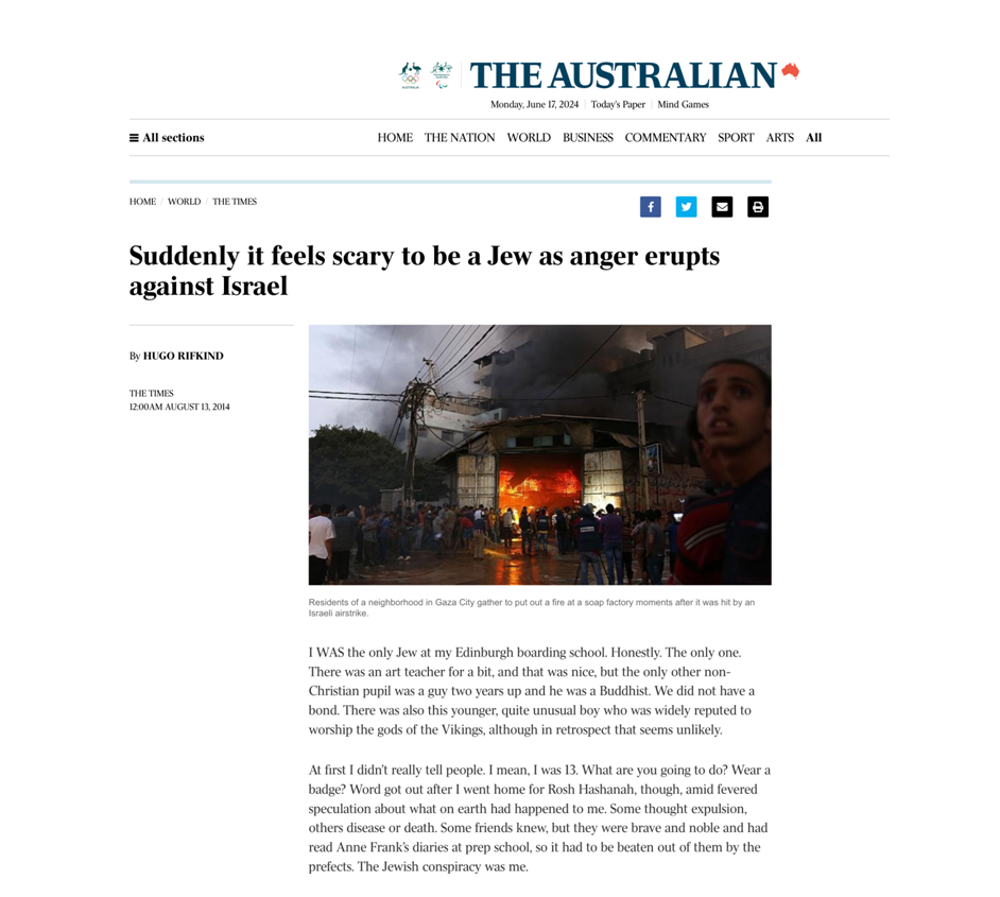
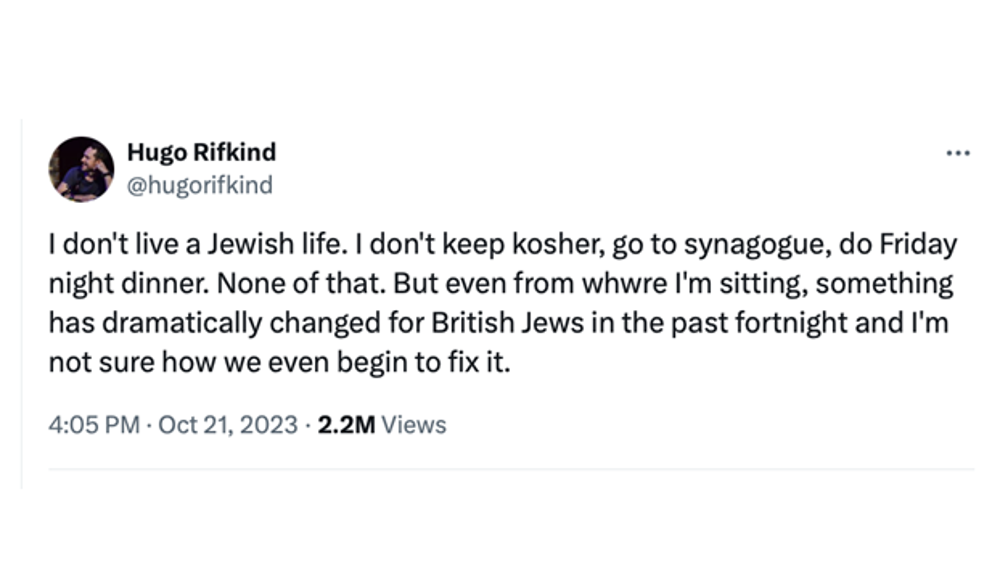
Zionist journalists
As well as providing a tone to the opinion pages, there are many appointments of journalists, who are effectively Zionist infiltrators.
- Henry Zeffman between 2016 and 2023 worked at the Times, rising to Associate political editor and covering many stories including attacking Diane Abbott - a key lobby target.
- Gabriel Pogrund, is a South African Zionist, a former member of the RSY-Netzer Zionist youth group, which he first had “contact” with in 2009. He attended one of their colonial year-long visits to occupied Palestine in 2012-3.
The purpose of these trips is to radicalize Jewish youth into supporting the genocidal ideology of Zionism. In 2020 Pogrund wrote an anti-Jaremy Corbyn book, titled Left Out: The Inside Story of Labour Under Corbyn.
Recently he broke stories given to him by the Labour Party such as on the imminent suspension of Faiza Shaheen who was then replaced by a Zionist candidate.
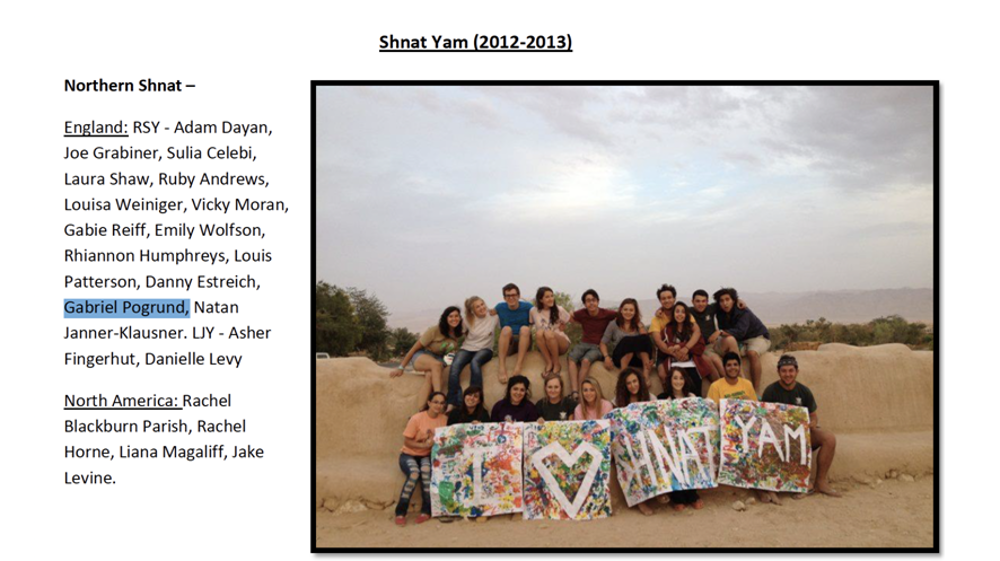
- Dominic Kennedy is of Irish origin and says he reports on “rogues”. Among his targets are pro-Palestine activists, especially Muslims, but also Roger Waters, George Galloway, and even me.
The infiltration of Zionists into the media in the West is a significant and pressing problem.
It manifestly helps to protect the Zionist narratives from challenges on top of the structural dominance that the narrative has, via both Zionist and official Western sources.
David Miller is the producer and co-host of Press TV’s weekly Palestine Declassified show. He was sacked from Bristol University in October 2021 over his Palestine advocacy.
VIDEO | Paris celebrates 47 years of Islamic Revolution in Iran
VIDEO | Killed twice: Palestinian-Americans and the price of silence
VIDEO | Pakistan slams US for publishing map depicting Kashmir as part of India
VIDEO | India-US trade deal faces protests from unions, opposition
VIDEO | 44th Fajr film festival closes with award ceremony in Tehran
North Korea warns of 'terrible response' to drone incursions from South
Whistleblowers: CPJ scrapped 'impunity index' to shield Israel
Trump creating conditions that may lead to 'good deal' with Iran: Netanyahu


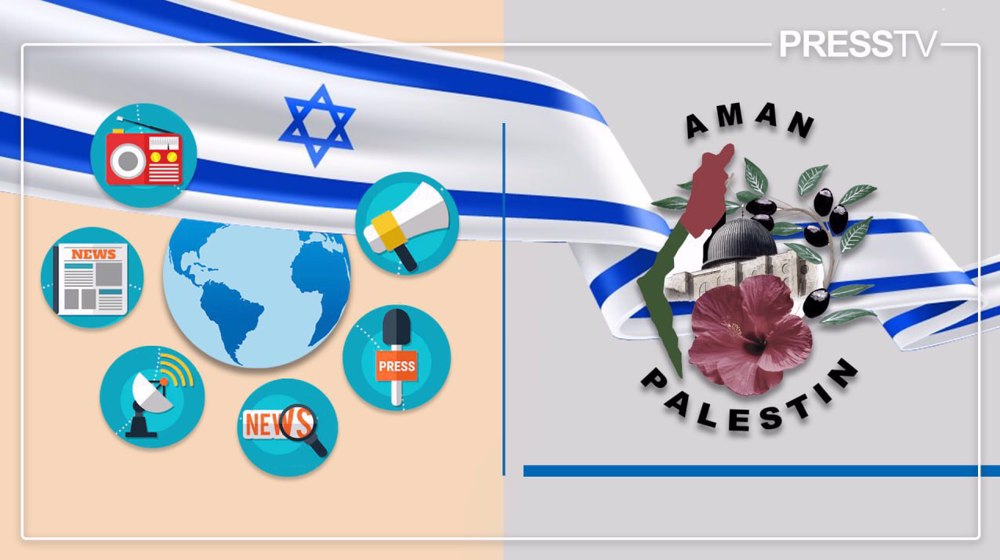
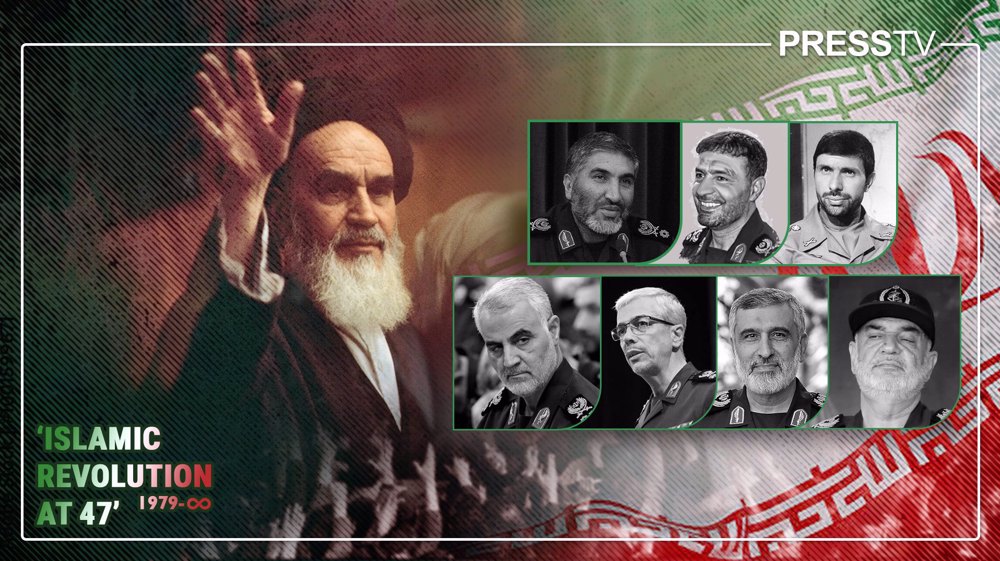
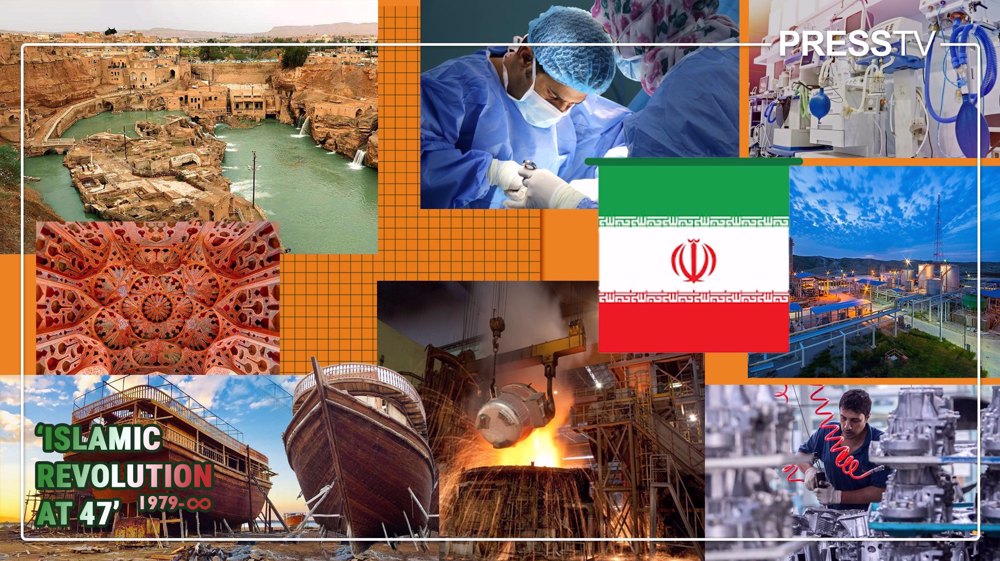
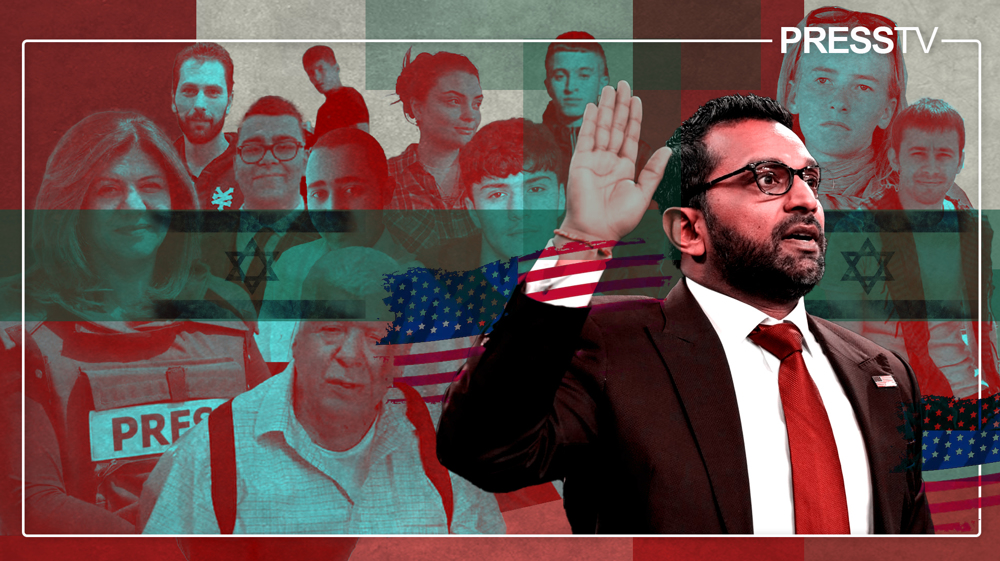



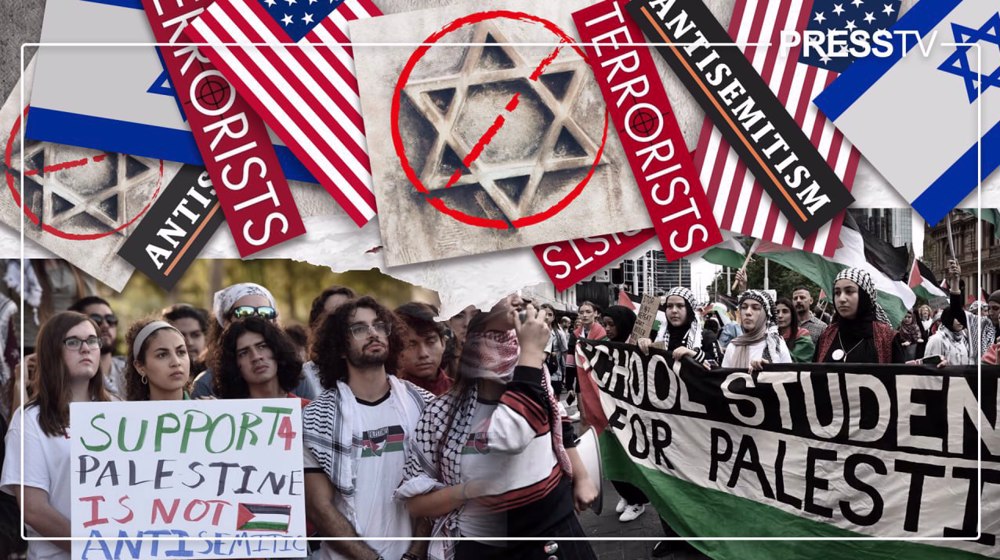
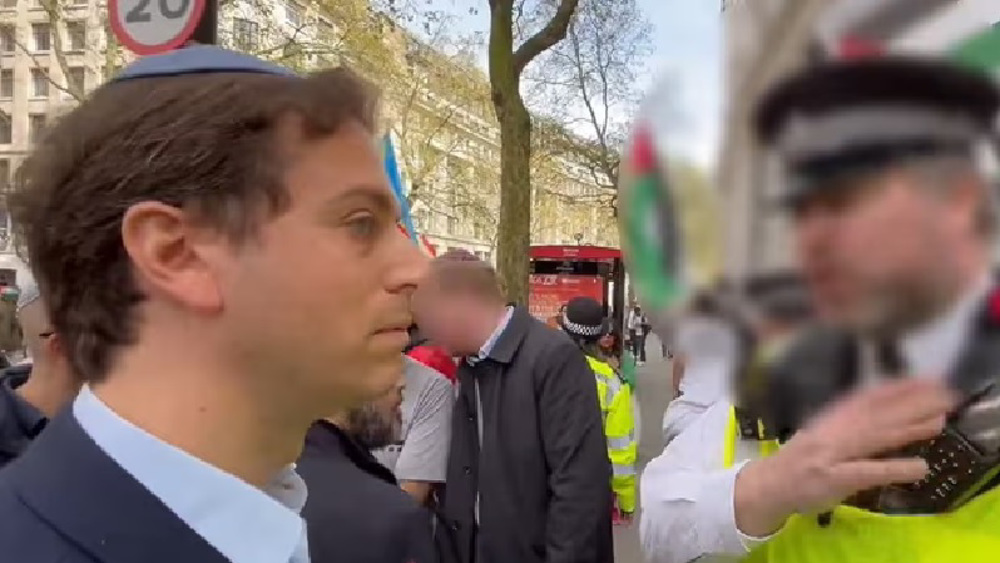
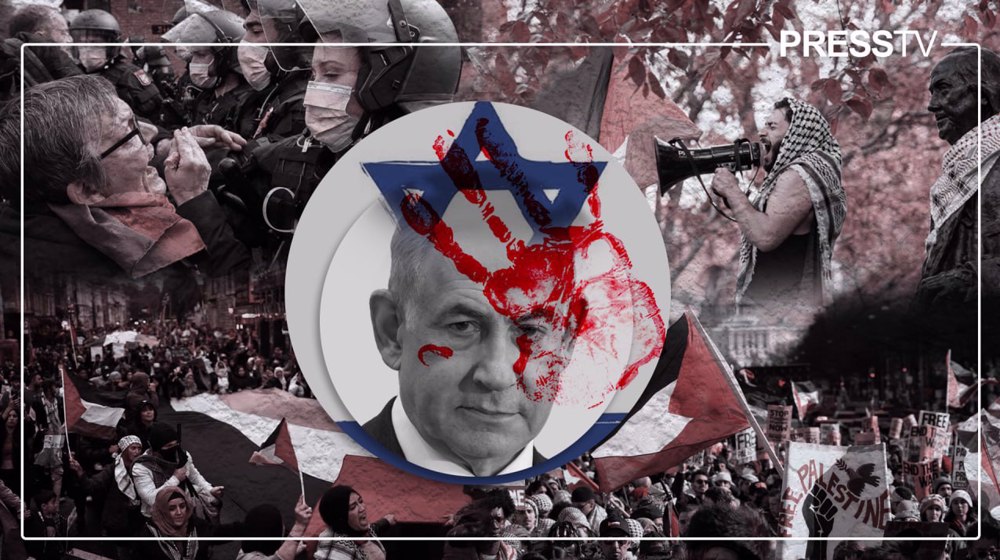
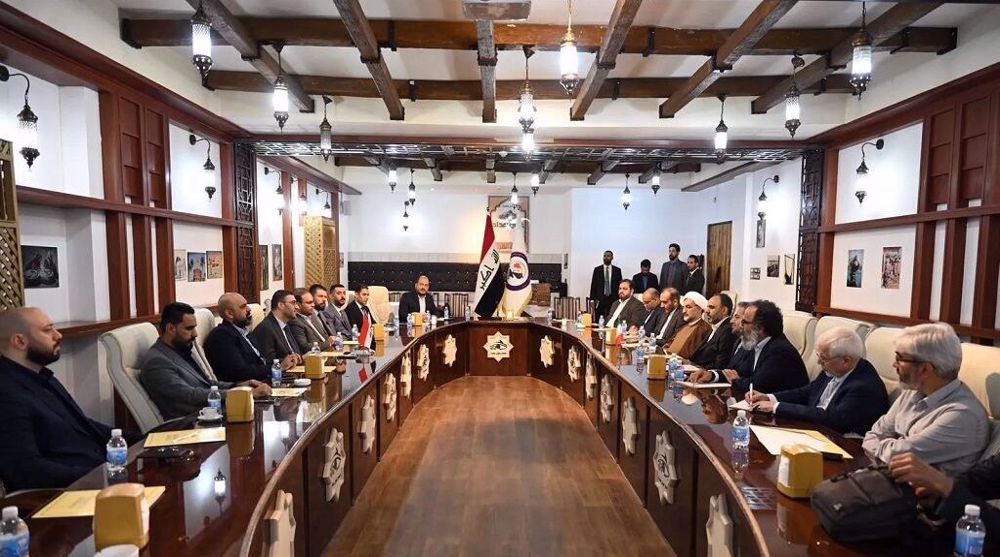
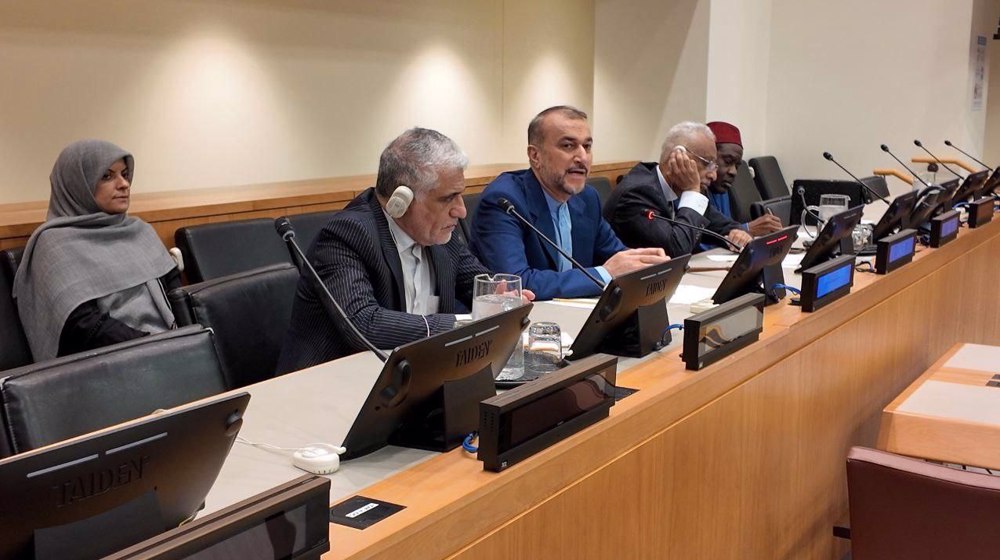

 This makes it easy to access the Press TV website
This makes it easy to access the Press TV website